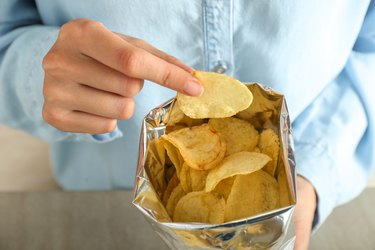Jonesing for junk food? Though salt and sugar cravings can seem to strike out of nowhere, they might not be as random as you think.
Turns out, there's usually a real biological reason behind your hankering. Here, experts explain why you're longing for those cookies and chips, and offer healthy ways you can curb those cravings.
Video of the Day
Video of the Day
1. You’re Sleep-Deprived
One-third of American adults aren't getting the recommended minimum of seven hours of zzzs per night, according to the Centers for Disease Control and Prevention. The problem? When you're sleep-deprived, it's really hard to curb your cravings and dial back the overeating, says Molly Kimball, RD, a registered dietitian with Ochsner Fitness Center in New Orleans.
What's more, after a sleepless night, you desire more calorie-dense, high-fat foods, per an October 2019 study published in eLife. Researchers believe that's because lack of sleep makes your brain especially receptive to the aromas of enticing foods.
Plus, if you're running on empty, your body tends to beg you for carb-rich, sugary foods to give you a quick energy boost, says Kimball.
The fix: Take a nap. A quick 30-minute snooze may offset a lackluster night of sleep and reduce stress, according to a March 2015 study published in the Journal of Clinical Endocrinology & Metabolism.
And when napping isn't possible, crush those cravings with a healthy snack that fuels your body properly, says Frances Largeman-Roth, RDN, a Brooklyn-based dietitian and author of Eating in Color: Delicious, Healthy Recipes for You and Your Family. She recommends a bowl of high-protein yogurt topped with nuts and fresh fruit. To satisfy your sweet tooth, you can even sprinkle a few dark chocolate chips on top.
Ready to Lose Weight?
Set yourself up for success with more from our 30-Day Weight-Loss Kickstart.
2. You’re Stressed
Feeling like your stomach's a bottomless pit? Check your stress levels. Stress-eating is a real thing, according to Harvard Health Publishing. That's because when you're under strain, your body unleashes a ton of hormones, including cortisol, which kicks off a veritable roller coaster of blood sugar highs and lows. The result? A ravenous increase in appetite.
The problem is that we tend to forego the bag of carrots in favor of candy, cookies, ice cream and other sweet treats, says Largeman-Roth.
And there's a legit biological reason for this. According to Harvard Health Publishing, high-fat and sugary foods seem to stifle stress-related responses in the body. That's why people instinctively reach for "comfort foods," since they literally provide comfort to counteract stress.
The fix: Instead of bingeing a sleeve of Oreos to soothe your stress, implement healthier stress-management solutions into your daily routine. Try meditation, deep breathing and/or exercise, or reach out to a loved one for emotional support. Regular self-care is the best weapon for combatting stress and overeating.
Related Reading
3. You Skimp on Carbs
Trying to cut back on refined carbs and added sugars? That's certainly smart for overall health; but over-restricting carbs can backfire. How? A restrictive diet can lead to intense sugar cravings, and, ultimately, sugar binges, Largeman-Roth says.
Plus, if you're not consuming enough carbs, you might feel fatigued — and we already know that being tired is a recipe for disaster when it comes to junk food cravings.
The fix: Eat plenty of fresh fruit, like grapes, apples, mango and pears, which are all naturally sweet and satisfying, Largeman-Roth says. "And don't cross dessert off your list forever!" she adds. Give yourself the permission to enjoy the occasional ice cream cone or oatmeal cookie.
4. You're Eating Too Many Carbs (and Not Enough Protein or Fat)
On the other hand, eating too many carbs — and skimping on fats and protein — can perpetuate a cycle of cravings too, says Kimball. This is especially true when you consume lots of processed, refined carbs, like the kind found in breakfast cereals, granola bars and sugary yogurts.
Here's what happens when you nosh on simple carbs: Your body quickly digests the sugars, which enter the bloodstream and give you a rapid release of energy. The problem? You crash just as fast.
And, without enough fat or protein — which take longer to break down in your stomach, stabilize your sugar and insulin levels and keep you feeling full —you're soon hungry again and hankering for that next, sweet pick-me-up, says Kimball.
The fix: For starters, choose whole grains and unrefined, unprocessed carbs and aim to have protein and fat with every meal and snack.
Also, be aware of consuming multiple carbs at once, says Kimball. For example, instead of nibbling on fresh fruit and whole-grain crackers (which are two sources of carbs), select one healthy carb and pair it with cheese, almond butter or avocado.

5. You Have a Nutrient Deficiency
Craving a specific food? Your body might be sending you a signal.
Case in point: If you find yourself with a nagging need for something salty, like pretzels or chips, you might be lacking sodium, Largeman-Roth says. Though most Americans consume too much salt in their diets, it's still possible for someone to ingest too little, according to the Mayo Clinic.
For example, if you work out hard and sweat buckets, or you come down with the stomach flu, you could lose a lot of fluids, which can disrupt the balance of your electrolytes and result in a salt craving.
The same goes for sugar. A relentless sweet tooth might be a sign of an iron deficiency. Since a lack of enough iron causes fatigue, people may yearn for sugary foods like candy for a quick burst of energy, Largeman-Roth says.
The fix: If you're constantly craving sweets, try incorporating more iron-rich foods into your diet, like lean cuts of beef and lamb, eggs and seafood. For plant-based iron sources, look for fortified cereals and oatmeal, spinach, Swiss chard and dried apricots, Largeman-Roth says.
And when it comes to sodium, heat up a bowl of chicken soup instead of reaching for a bag of chips. In addition to providing sodium, soups also offer protein, hydration and a healthy dose of vegetables, says Largeman-Roth.
7. You Have a Gut Issue
When you have an imbalance in the bacteria that inhabit your gut, you might have too many harmful yeast or fungi infesting your intestinal tract. The thing is, these microbes need sugar or fat to thrive.
Meaning? To get the nutrients they need, your gut microbes will induce cravings. Crazy, right?
But it's true. According to an October 2014 study in BioEssays, gut microbes can manipulate your eating patterns by making certain foods taste better or releasing hunger-inducing hormones to promote their own survival.
The fix: For a balanced gut, integrate fermented foods like kimchi, kombucha and kefir into your diet or take a probiotic to ensure your GI tract is flourishing with healthy flora.
Related Reading
- Harvard Health Publishing: “Why stress causes people to overeat.”
- Centers for Disease Control and Prevention: “1 in 3 adults don’t get enough sleep.”
- eLife: “Olfactory connectivity mediates sleep-dependent food choices in humans.”
- Journal of Clinical Endocrinology & Metabolism: “Napping Reverses the Salivary Interleukin-6 and Urinary Norepinephrine Changes Induced by Sleep Restriction.”
- BioEssays: “Is eating behavior manipulated by the gastrointestinal microbiota? Evolutionary pressures and potential mechanisms.”
- Mayo Clinic: "Hyponatremia"
